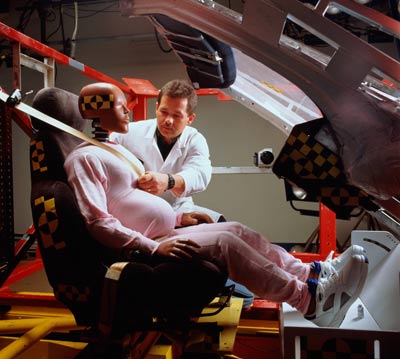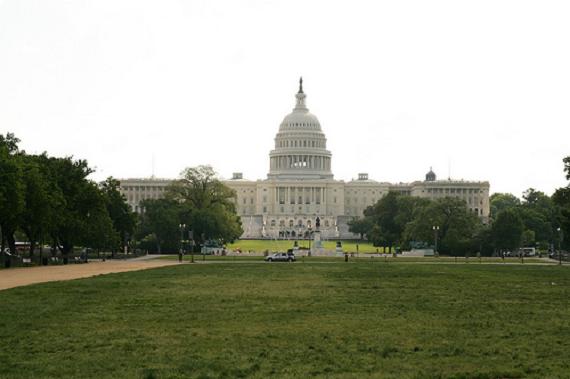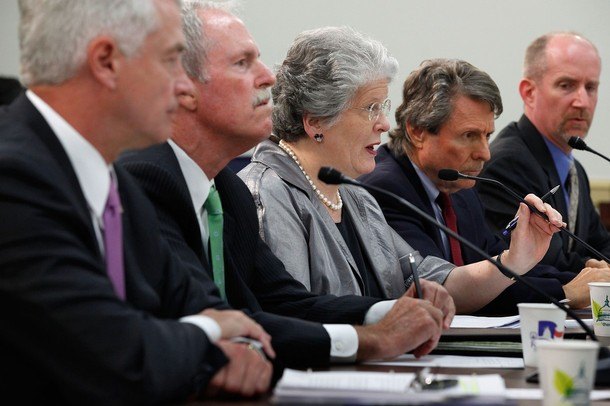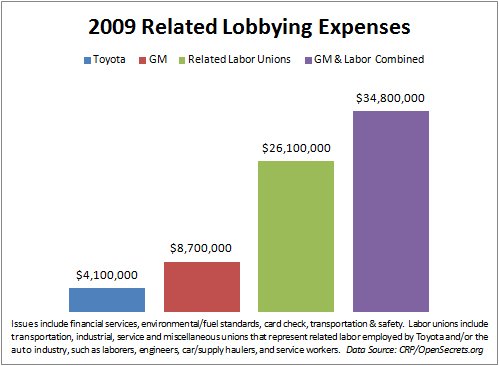#congress
Safety Act Sweeps Senate Commerce Committee
$11b Electric Drive Vehicle Deployment Act Introduced, Industry Says "No Thanks"
The Detroit News reports that two versions of the Electric Drive Vehicle Deployment Act of 2010 will be introduced today in the House and Senate. Both bills would spend about $11b by sending $800 million to $1 billion five to eight “deployment communities.” One of the EDVDA’s bipartisan sponsors, Rep Judy Biggert (R-IL) explains that these funds
will help regional communities establish themselves as models for the development and installation of the next generation of transportation infrastructure, including public charging stations
The bill is being backed by several small EV firms, like A123 Systems and Bright Automotive, under the rubric of the Electrification Coalition. And despite the fact that everyone loves a good subsidy, the mainstream automakers are not amused.
House Energy And Commerce Committee Approves New NHTSA Fine Cap, "Vehicle Safety User Fee," More
The House Energy And Commerce Committee has passed an amended version of the Motor Vehicle Safety Act that was previously approved by its Subcommittee on Commerce, Trade and Consumer Protection. True to our prediction, longtime auto industry ally Rep John Dingell (D-MI) was able to maintain caps on NHTSA’s fining power at $200m per automaker per defect recall (up from the current cap of $16.4m) and $5m per auto executive per defect, and require that NHTSA inform automakers and allow for an appeal before invoking the “imminent hazard” powers authorized by the bill. Dingell tells Automotive News [sub] that
The bill is going to be a hard one for the industry to accept, but I believe it’s in the public interest and is good overall.
Congressional Ghost Busters Empty Handed
Yesterday’s Toyota hearing at the U.S. House of Representatives Energy and Commerce Committee was a desperate attempt to keep the Toyota issue in the headlines, and to provide flanking support for Waxman’s proposed Motor Vehicle Safety Act. The ghosts in the machine are still at large …
Motor Vehicle Safety Act Passes First House Hurdle
Rep Henry Waxman’s version of the Motor Vehicle Safety Act passed the House Subcommittee on Commerce, Trade and Consumer Protection today, and will go before the full Committee On Energy And Congress. The subcommittee markup [in PDF format here] includes a number of provisions that the industry and others had argued against, such as a $9 fee on each new vehicle sale, and mandatory event data recorders (EDRs) which would “continuously record vehicle operational data” and store all data from 60 seconds before, and 15 seconds after a crash. According to Automotive News [sub], Rep John Dingell is in negotiations with committee chairman Waxman to mitigate two key proposals: the removal of a cap on NHTSA fines, and the granting of so-called “imminent hazard” authority.
Did Toyota Plan Sneak Attack On Capitol Hill?
Congressional lawmakers are mad at Toyota. What has Toyota done now? Their sin this time: They may have harbored a secret “attack plan against congressional testimony.” This, says the Washington Post, has “drawn the ire of the House Energy and Commerce Committee.”
Industry, Republicans Attack Proposed Auto Safety Legislation, NHTSA Plays It Cool
Due to scheduling conflicts with a certain island nation’s democratic rituals, CSPAN didn’t have a channel to spare for today’s auto safety legislation hearing before the the House Energy and Commerce subcommittee. Which means your faithful blogger is at the mercy of the mainstream media’s digestive process in this matter. Regardless, it seems clear by now that the legislation has driven the industry back to the Republican bosom, after a period of post-bailout estrangement. These newly-re-allied forces collectively raised concerns about a number of key proposals presented by Rep Henry Waxman’s Motor Vehicle Safety Act of 2010, including the un-capping NHTSA fines, privacy issues relating to “black box” event data recorders, new car sale vehicle fees, pedal clearance standards, and increased regulation of an industry with state-owned competitors.
Motor Vehicle Safety Act of 2010 Unveiled
Senator Jay Rockefeller (D-WV) has introduced a draft version of his Motor Vehicle Safety Act of 2010. As TTAC has reported, the bill contains a number of provisions, including mandated pedal distances, mandatory brake override, keyless ignition standards, vehicle event data recorder standards, transmission configuration standards, increased penalties for recall delays, and much, much more. Hit the jump for a full description of the measures under consideration.
Inspired By Quadrangle Scandal, Republicans Call For Investigation Into Rattner's Delphi Dealings
When former auto task force boss Steve Rattner’s former firm Quadrangle recently settled a “pay-to-play” corruption investigation, it threw Rattner under the bus, saying:
We wholly disavow the conduct engaged in by Steve Rattner, who hired the New York State Comptroller’s political consultant, Hank Morris, to arrange an investment from the New York State Common Retirement Fund. It is our understanding that Mr. Rattner also arranged a DVD distribution deal for a movie produced by the Chief Investment Officer’s brother in the middle of the investment decision-making process. That conduct was inappropriate, wrong, and unethical. Mr. Rattner is no longer with the firm and is not a part of today’s settlement. Quadrangle will fully cooperate in the Attorney General’s ongoing investigation of Mr. Rattner and others.
According to the DetN, that stinging indictment by Rattner’s former firm has inspired House Republicans to call for an investigation into whether Rattner was behind a deal in which some Delphi retirees lost their pensions while others didn’t.
Draft Safety Legislation: $3-$9 New Car Sale Fee, Unlimited Defect Fines, Mandatory Pedal Distances, More
The Detroit Free Press got its hands on draft auto safety legislation drawn up by Senators Waxman and Rockefeller, and aimed at preventing another Toyota recall-style scandal. In addition to mandating brake override systems on all cars sold in the US, The Freep says the bill would require that
[NHTSA] come up with rules for space between the brake and accelerator pedals, gear shift designs and stop-start systems – all problems highlighted by the Toyota probe. Automakers would be required to build vehicles with event data recorders that could be easily read, a step Detroit automakers made several years ago but that Toyota and other foreign brands have resisted.
Despite the Freep’s attempt at making the bill sound like it’s only going to affect Toyota and other non-Detroit automakers, there is plenty in the proposed legislation that could hurt any automaker.
Senate Moves On Auto Safety, NHTSA "Revolving Door" Legislation, Stands Firm On Dealer Finance Oversight
The Treasury may be standing by GM’s “payback” claims, but the Congress hasn’t exactly been looking for ways to do the auto industry any favors. In fact, a toxic brew of political fallout from the financial crisis, auto bailout, and Toyota recall scandal has seems to have inspired a backlash against the industry that came to a head this week in the US Senate. Legislation has been introduced that would prevent NHTSA officials from taking jobs with automakers for up to three years after they leave the agency, and yet more is being drafted which could require a vast array of standard safety equipment on all cars sold in the US and could even add a federal fee to new car sales. Adding insult to injury, a much-hoped for exception to dealer financing oversight in the new financial reform bill appears to have fallen victim to Senate negotiations. Did nobody tell the old guys that they’re investors in the auto industry?
Treasury: GM "Payback" Claims Not Misleading
In response to Senator Chuck Grassley’s concern that GM’s claim to have paid back taxpayer loans was misleading, the US Treasury is now saying that it has no problem with The General’s statements. According to the Freep, a Treasury letter to Grassley explains that:
GM’s decision to pay off the loan signaled the automaker did not face “extraordinary expenses,” and that Treasury approved the loan payoff.
“The fact that GM made the determination and repaid the remaining $4.7 billion to the U.S. government now is good news for the company, our investment and the American people,” said Herbert Allison, assistant Treasury secretary for financial stability.
Strictly speaking, GM’s claim to have paid back all US Government loans is correct. The only issue is that GM’s ad touting the payback makes no reference to the fact that it still owes the Treasury upwards of $40b. If that misleads folks, well, apparently the Treasury Department isn’t going to do anything about it.
GOP Reps: Did The White House Pressure State-Owned Automakers Into Accepting GHG Standards?
With Senator Chuck Grassley (R-IA) already taking the White House and Treasury to task for possibly helping GM avoid paying the “TARP Tax,” Republican representatives Darrell Issa (R-CA) and Lamar Smith (R-TX) are attacking the auto bailout from another angle, writing a letter to nine automaker CEOs requesting clarification of the negotiating process that led to recently-passed final rules on a ramp-up of greenhouse gas (GHG) emissions standards. In their press release on the issue, Issa and Smith note:
It is unclear whether the Administration used leverage created by the possibility of a taxpayer bailout of GM and Chrysler to secure their cooperation and support for new fuel economy standards. Moreover, there is reason to believe Administration officials used inappropriate tactics to ensure broad based support across the industry. Given the clear conflict-of-interest issues at play, which naturally arise when the government is in a position to pick winners and losers and impact the future viability of private entities, it was imperative that the Administration act with the utmost transparency. Instead, the White House imposed an unprecedented level of secrecy.
Are Issa and Smith on to something, or is this simply a partisan dogpile on an unpopular policy? Hey, this is politics… does it even matter?
Grassley: Was GM's "Payback" Shuffle About Avoiding The TARP Tax?
While the White House and most of the media spent the last two days parroting GM’s claim that it “paid back” taxpayers, Senator Chuck Grassley was busy writing a letter to the Secretary of the Treasury [ letter available in PDF here]. The three-page note opens:
Dear Secretary Geithner:
General Motors (GM) yesterday announced that it repaid its TARP loans. I am concerned, however, that this announcement is not what it seems. In fact, it appears to be
nothing more than an elaborate TARP money shuffle.
No surprises there: TTAC has been all over this ruse for months now. Grassley does sum the situation up nicely, stating that “A debt-for-equity swap is not a repayment,” but the most interesting part of his letter is his theory for why GM and the Administration approved the tax-money reshuffle. Thus far, we’ve assumed that PR was the driving concern in this transparent deception. According to Grassley though, there may be another reason…





























Recent Comments